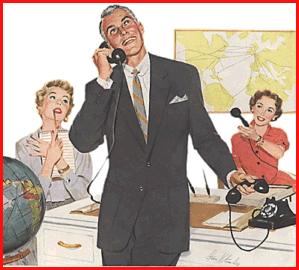

mailto: payer@payer.de
Zitierweise / cite as:
Payer, Margarete <1942 - >: Kulturen von Arbeit und Kapital. -- Teil 3: Kapitaleignerkulturen. -- 7. Postsowjetische Oligarchen. -- Fassung vom 2005-12-17. -- URL: http://www.payer.de/arbeitkapital/arbeitkapital0307.htm
Erstmals publiziert: 2005-12-17
Überarbeitungen:
Anlass: Lehrveranstaltung an der Hochschule der Medien Stuttgart, Wintersemester 2005/06
Copyright: Dieser Text steht der Allgemeinheit zur Verfügung. Eine Verwertung in Publikationen, die über übliche Zitate hinausgeht, bedarf der ausdrücklichen Genehmigung des Verfassers.

Diese Inhalt ist unter einer Creative Commons-Lizenz lizenziert.
Dieser Text ist Teil der Abteilung Länder und Kulturen von Tüpfli's Global Village Library
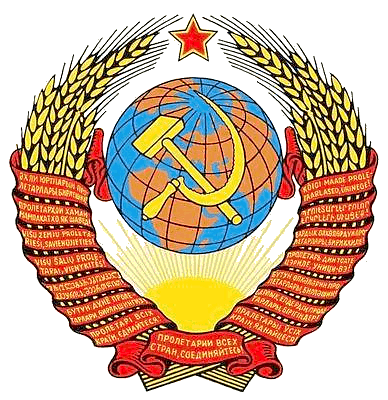
Union der Sozialistischen Sowjetrepubliken (UdSSR)
†
Союз Советских Социалистических Республик
Союз Радянських Соціалістичних Республік
Саюз Савецкіх Сацыялістычных Рэспублік
Совет Социалистик Республикалари Иттифоқи
Советтік Социалистік Республикалар Одағы
საბჭოთა სოციალისტური რესპუბლიკების კავშირი
Совет Сосиалист Республикалары Иттифагы
Tarybų Socialistinių Respublikų Sąjunga
Униуня Републичилор Советиче Сочиалисте
Padomju Sociālistisko Republiku Savienība
Советтик Социалисттик Республикалар Союзу
Սովետական Սոցիալիստական Հանրապետությունների Միություն
Nõukogude Sotsialistlike Vabariikide Liit
Совет Социалистик Республикалар Союзы
Sosialististen Neuvostotasavaltojen Liitto
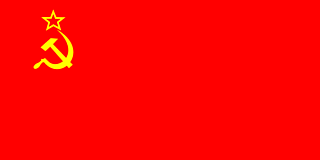
Motto: Geld — Du Maitresse der Welt!! Lug und Trug
Die ganze Welt —
Das Losungswort:
Heißt Geld, nur Geld! —
Wer es besitzt —
Der ist Regent —
Wer nichts hat —
Arm und dekadent!
Der größte Schuft
Wühlt oft im Gold,
Dem Ehrlichen
Das Schicksal grollt.
Er gilt nichts
Trotz der Ehrlichkeit,
Der Schuft jedoch
Er macht sich breit.
Er hat zu leben
Nur ein Recht —
Der arme Kerl
Et bleibt sein Knecht!
Lehn Dich nicht auf, Knecht —
Sei doch gescheit —
Es bleibt so —
Bis in Ewigkeit. —Gürtler, Danny <1875 - 1917>: König der Bohême : Gedichte. --
Mannheim : Stern-Ellreich, [1908]. -- S. 25.
"Russia’s Nouveaux Riches Shake Up Monaco
Monaco-Bezug
Abb.: Monaco - Treffpunkt der postsowjetischen Neureichen
[Bildquelle. Wikipedia]Created: 06.10.2005 12:34 MSK (GMT +3), Updated: 17:12 MSK
Andrei Cherny
The Moscow News
Abb.: Image by MosNewsRussia’s newly affluent flaunt their wealth on Cote d’Azur with oligarch
Roman Abramovich [Роман Абрамович] setting the pace. The hot spot where Arabian sheiks and American millionaires once came to gamble is now crowded with Russians and Ukrainians.
Monaco is a sickle-like strip of prosperous land terracing up the mountains and cascading down toward the sea, with a population of 30,000, only 7,000 holding citizenship. A toy state sandwiched between France and Italy, it is one of the most affluent countries in Europe. Flowers, palms, and greenery on every square inch of land; marinas packed with yachts; streets looking as though they have just been shampooed; restaurants, boutiques, casinos, nightclubs, and sandy beaches. Monaco is a country of legitimate luxury, one of the most expensive and exclusive places in Europe. People from all over the world come here to spend their money. This past summer has seen a “Russian boom.”
“We’ve been working in Monaco for 22 years and have not until recently seen any Russians here. They appeared three years ago, but this year they have made our season!” Chantal Sobra, director of the Louis Vuitton store, says. The three-level, renovated, sparkling Vuitton is one of the most expensive boutiques on the coast.
“Russians are au courant on everything — competition, new products, the latest trends.
”And they are tres chic,“ the director says amid a flurry of activity around three Russian women clients. The provincial looking Russians are ordering about a sales assistant with the help of sign language and are terribly reminiscent of Cinderella’s sisters from the prewar Russian film.
”I was walking about Monte Carlo and I saw this shop. I had just been given a watch from that firm. I walked in. A similar model cost $40,000. But mine has fewer diamonds so it’s probably worth just $20,000,“ a Barbie kind of girl says plaintively to her macho companions at Cafe de Paris.
There are legends about Russians in Monaco.
This week, a Russian sugar daddy with several female companions had breakfast at a restaurant, shelling out 110,000 euros and then giving a 10,000 tip.
An unfamiliar word, screamed out in a horrifying voice, attracted everyone’s attention at Casino SUN. Three-hundred thousand euros that an unknown Russian lost in one fell swoop enriched the Monegasques’ vocabulary with a Russian profanity. The loser walked out of the hall, while the game continued as usual.
The beach at the Beach Hotel is the best in Monaco: It is used by the prince himself. Yet even here everyone was stunned by the appearance of a boy of about 10 with a wad of pink 500-euro bills, saying: ”Dad gave it to me to celebrate my birthday!“
Last year, the yacht of a minor oil tycoon called at the Port d’Hercule. At midnight, its lights went up to the accompaniment of disco music. Before long, however, the yacht’s owner lost moorage rights and was told never to enter Monaco waters again. Well, you don’t argue with the prince.
Still, the more money they spend, the better. Even the harsh traffic police try not to fine the drunk drivers of luxury cars when they leave casinos.
Monaco’s uncrowned king — Societe des Bains de Mer (SBM) which owns the country’s best hotels, casinos, and banks — has for the past one and a half centuries been managing its properties with an iron hand. Each SBM hotel, where prices start at $1,500 for a single room, has luxury suites at 2,000 to 7,000 euros a night during the high season.
Earlier, they were used only by Arab sheiks and U.S. millionaires. Today, Russians seem to have crowded them out.
”The local atmosphere of permanent holiday and festivity produces a strong psychological effect. This summer, very serious money has been won and lost at Monte Carlo,“ Alex Oppenot, the SBM marketing director, says.
SBM sees the ”Russian invasion“ as renaissance — the Return: After all, the place was a favorite with Russia’s grand dukes; there were Diaghilev Russian seasons and Nijinsky shows, and Russian industrial magnates played the roulette wheel here.
The new Russians’ lineage does not really matter: What counts is their money. Today, they have loads of money. One indication of this are the prices at Russian art auctions.
A recent match between a Russian and a Monaco soccer club, according to Alex Oppenot, increased the Russian presence in Monte Carlo by 64 percent. The match was not simply a sporting event but an excellent opportunity for self-promotion. Attendance at the stadium is a sign of affiliation with the caste of wealthy, happy, and successful. The number one name here is Roman Abramovich [Роман Абрамович]. His appearance at Monte Carlo, which has seen plenty, created a stir: Roman and his party on the coast; Roman and his yacht, the Pelarus [Пелорус] (resembling rather a warship); Roman and his girlfriends — according to eyewitness accounts, not quite of age; Roman at Jimmy’z, a night club where a glass of water costs 40 euros.
Abb.: Pelorus yacht / Яхта Пелорус
[Bildquelle: http://www.roman-abramovich.com/roman-abramovich-yacht.htm. -- Zugriff am 2005-12-06]The blatant flaunting of wealth is an infectious example for dozens of his Russian compatriots.
Real estate is the first and foremost concern for Russians on Cote d’Azur. Villa prices range from 70 million to 200 million euros, but at Cannes, Cap Ferra, Antibes, and especially Monaco, everything has already been bought up. La Vigie, a three-level villa overlooking Monte Carlo’s best beach (80,000 a month) was rented by a Russian for the entire swimming season — April through October.
Yachts are another important prestige factor. There is a kind of tacit competition for yacht size. Every extra meter costs about 1 million. Yacht builders meet at Port d’Hercule every year, showing their products, striking deals, and taking orders.
Finally, the life style. There are more car showrooms than groceries here. A Maybach or a Lamborghini here costs one-half of what it does, e.g. in France, where the luxury tax is charged. Motor vehicles parked outside the Grand Casino, built by the legendary Garnier and reminiscent of the Opera de Paris building, are not to be seen anywhere else. You cannot, however, drive to neighboring Nice in such a car, gold coast people complain: Its body will be scratched or its tires will be slashed there. You’ve got to live in Monaco: It has everything — golf fields, tennis courts, sea baths, and spa salons. Russians in Monaco are clients who must not be humiliated by low prices, especially when comfort, heat and excitement are closely intertwined.
Abb.: Casino Monte Carlo
[Bildquelle: Wikipdia]The Monte-Carlo Casino overlooking the Mediterranean is the best known casino in the world. Royal persons and upstarts, aristocratic old ladies and golden youth, cardsharpers and spies have all played there. These include fortune seekers from the CIS [GUS, СНГ]. They are referred to indiscriminately as ”Russians.“ As a matter of fact, they are Ukrainians, Kazakhs, Moldovans, Armenians, etc. A running joke here has it that one day the Monegasques will learn to tell Kazakhs from Belarusians as they once learned to distinguish between the Japanese and Chinese. The naive SBM managers are going to introduce a special seminar to teach Russians ”civilized gambling“ - i.e., how to play cards without relying on luck alone. They must not have read Dostoyevsky’s [Фёдор Миха́йлович Достое́вский] The Gambler [Игрок].
On Avenue des Beaux-Arts, a tiny street in downtown Monaco comprised of luxury boutiques and jewelry houses, the strong smell of petrodollars is converted into the fragrance of orchids. Fall-season collections have been swept by a hurricane from Russia. One of the most popular types of massage on the list offered to SBM luxury hotel clients is ”after-shopping massage.“ This year, Monaco’s couture stores have seen their profits rise 30 to 40 percent — mainly due to Russian and Ukrainian money.
”This summer, Americans stayed at home: Because of the dollar’s low exchange rate, it is unprofitable to travel to Europe. The Arabs have their own problems to deal with. There are also very few Japanese: They are afraid of terrorist attacks on airplanes. If it was not for the Russians, we would have been left without any profit,“ SBM managers say.
The exuberant lifestyles and spending practices that Russians, dizzy with the unlimited opportunities, demonstrated at first by buying the most expensive things, are now giving way to the ”getting-into-the-mainstream“ ambition — i.e., being like everyone else. Today, SBM managers believe, wealthy Russians are striving to be accepted into the fold of civilization. The Monegasques, however, only want to see the tip of the iceberg — that is to say, profits from the Russians’ exuberant spending practices.
Abb.: AS Monaco FC
(Pressefoto ASM)Prince Albert, the patron of sports, however, objected to the idea of selling the Monaco soccer club to a Russian businessman, Aleksei Fedorychev [Алексей Федорычев], saying that the club must not be in the hands of a foreigner. That was the first time when the issue of the provenance of money came up. Nevertheless, that did not prevent Fedorychev from becoming the main sponsor of the Monaco club.
Russian oligarchs, raised on oil, natural gas, and god knows what else, seem to be living in total ignorance of their own country — vast and impoverished, with low living standards and high mortality rates."[Quelle: http://www.mosnews.com/commentary/2005/10/06/newrussians.shtml. -- Zugriff am 2005-12-06]
"London Becomes Haven for Russia’s Robber-Barons — Paper
UK-Bezug
Abb.: London - Zufluchtsort russischer Räuberbarone
[Bildquelle: Wikipedia]Created: 25.10.2005 11:08 MSK (GMT +3), Updated: 11:35 MSK
MosNews
London Mayor Ken Livingstone is engaged in a determined and successful campaign to attract Russia’s super-wealthy, the Guardian reported in an article Tuesday.
Abb.: Ken Livingstone (1945 - )
[Bildquelle. Wikipedia]Britain has become an offshore depository for Russia’s robber barons, the Guardian claims. Those who plundered the natural wealth of the crumbling Soviet Union during the 90s “piratization” have ploughed their ill-gotten gains into London life. Money that should be in Russian pension funds, public salaries and supporting infrastructure is paying for private schools, chauffeurs and chefs in southern England, the paper wrote.
Their spiritual leader isRoman Abramovich [ Роман Абрамович] , the oil and aluminium billionaire and owner of Chelsea football club. He is joined by his former business partner and wanted defrauder of the Russian region of Samara,Boris Berezovsky [ Борис Березовский] . Equally at home flitting between Surrey and the City are the mineral billionaire Vladimir Potanin [Владимир Потанин], metals magnate Oleg Deripaska [Олег Дерипаска], and oil and gas speculator Chalva Tchigirinski. Given that so much of Russia’s wealth was given away to these oligarchs by the Boris Yeltsin [Борис Николаевич Ельцин] administration, it is appropriate that Tatyana Dyachenko [Татяна Дяченко], daughter of the former president, and her husband Valentin Yumashev [Валентин Юмашев] have also made London their base.
What attracts the Russian rich is favorable tax planning, the financial services sector, and a stable of corporate law firms for the endless litigation that pursues them. They also like the history and heritage of Britain along with high society’s no-questions-asked approach to fabulous new money.
However, the Guardian suggested the arrival of the super-wealthy in London may not be good for the city. First of all it is distancing the capital from the rest of the country, since London as a metropolitan appears to have an ever more distant relationship with its provincial hinterland.
More important, the riches that the south-east’s service economy is siphoning off represent a grotesque theft of assets from the Russian people. The 1990s saw a legal ram raid of Russian resources that sent life expectancy and GDP rates plummeting. London is enjoying these immoral earnings with absolutely no regard for their provenance."[Quelle: http://mosnews.com/news/2005/10/25/richinlondon.shtml. -- Zugriff am 2005-12-06]
"Russian Billionaires Unhappy with Forbes List
Russland-BezugCreated: 13.05.2004 11:25 MSK (GMT +3), Updated: 15:49 MSK
MosNews
Businessmen who made the Forbes list of Russia’s 100 richest people are not at all happy that the magazine decided to publish their names and to disclose the size of their personal fortunes. They say that it is now unfashionable and even dangerous to be a “public billionaire”.
The moneybags are upset both by the methodology that was used by Forbes, as many believe that their fortunes have been overestimated and by the possible consequences of appearing on the list which is headed by the jailed former Yukos [ЮКОС] CEO Mikhail Khodorkovsky [Михаил Ходорковский].
The Vedomosti [ВЕДОМОСТИ] business daily talked to several of those whose names appeared on the list on conditions of anonymity. “They [the magazine] couldn’t find a worse time and place… Personally the only reaction that I get from discussing personal wealth in our country is a high blood pressure,” said one of the newspaper’s sources. Another billionaire lamented that “appearing on such a list is bound to make the entrepreneur a prime target for the law enforcement authorities”.
The anxiety expressed by Russia’s businessmen is by no means groundless as there have already been precedents set abroad. In the spring of 2003 when Forbes published a list of the 100 richest people in China some of them were later arrested.
The “Golden hundred” of Russia according to Forbes consists of 36 billionaires, the personal fortunes of the remaining 64 businessmen who made the list amount to hundreds of millions of US dollars each. It should be noted that when on 27 February the U.S. edition of Forbes published a list of the world’s richest people, it included only 25 Russian businessmen. This means that “according to Forbes” over the last two and a half months the number of billionaires in Russia grew by 40 percent and the size of their combined fortunes increased from $79.4 billion to $110 billion.
Among the newcomers to the list are the president of Alfa Bank [Альфа-Банк ] Petr Aven [Петр Авен], head of Millhouse Capital David Davidovich, top manager of Sibneft [Сибне́фть] Andrei Gorodilov [Андрей Городилов], Russian senator Valery Oif, whose wealth is also attributed to Sibneft, the wife of the Moscow mayor, Elena Baturina, and member of the Russian parliament Alexander Lebedev who also serves as the president of the National Reserve Bank.
Among the businessmen who were most upset by the publication of the ratings were the billionaires who made their fortunes at the Sibneft [Сибне́фть] oil company. Roman Abramovich [Роман Абрамович], David Davidovich [Давид Давидович], Andrei Gorodilov and Valery Oif were positively furious, writes Vedomosti. The newspaper quotes the head of Sibneft’s public relations department Alexei Firsov [Алексей Фирсов] who said: “The rating has no connection with reality, the numbers are wildly speculative, the methodology used by the magazine is clouded in darkness.”
Abb.: Leonid Fedun — Леонид Федун
[Bildquelle: http://mosnews.com/images/p/2137.shtml. -- Zugriff am 2005-12-06]Leonid Fedun [Леонид Федун], vice president of Russia’s largest oil company Lukoil [ЛУКОЙЛ], whose wealth is estimated by Forbes to equal $1.7 billion, and sources close to the former head of the Gazprom [Газпром] natural gas monopoly Rem Vyakhirev, whose fortune according to the magazine is worth $2.4 billion, say that in reality their personal wealth is much less than Forbes asserts.
Abb.: Rem Vyakhirev
[Bildquelle: http://mosnews.com/images/p/2210.shtml. -- Zugriff am 2005-12-06]The only person who claims that his personal fortune has been underestimated is the exiled businessman Boris Berezovsky [Борис Березовский]. According to the magazine’s calculations today he owns $620 million. But, speaking to Vedomosti Berezovsky said: “In the middle of 1990 Forbes estimated my wealth at $3 billion. This means that either I spent $2.5 billion or their current estimates are incorrect.”"
[Quelle: http://www.mosnews.com/money/2004/05/13/billionairesunhappy.shtml. -- Zugriff am 2005-12-06]
Auch das ist Russland:
"Obdachlose, vernachlässigte und arbeitende Kinder gehören heute immer häufiger zum Straßenbild russischer Städte. Jedes Jahr fliehen über 50.000 Kinder in Russland auf die Straße. Denn Armut und Arbeitslosigkeit haben seit dem Zusammenbruch der Sowjetunion zugenommen und zu Alkoholismus und Gewalt in den Familien geführt. Viele Eltern können nicht mehr ausreichend für ihre Kinder sorgen, 60 Prozent schlagen ihre Söhne und Töchter sogar. Auf der Straße waschen die Kinder Autos, sammeln Flaschen oder verkaufen gestohlene Ware. Etliche prostituieren sich oder suchen Zuflucht zu Drogen. Für diese jungen Menschen hat UNICEF in Moskau und St. Petersburg ein Hilfsprogramm gestartet.
Abb.: Russische Straßenkinder
(Bildquelle: UNICEF)Die meisten Kinder auf der Straße arbeiten
Offiziellen Erhebungen zufolge gibt es heute etwa 100.000 bis 150.000 Straßenkinder in Russland. Allein in Moskau verbringen laut Internationaler Arbeitsorganisation ILO 30.000 bis 50.000 Kinder einen Großteil ihres Alltags auf der Straße. In St. Petersburg sollen es rund 15.000 Straßenkinder unter 13 Jahren sein. Viele Straßenkinder kommen aus Familien mit nur einem Elternteil oder mit Stiefeltern. Die Eltern jedes zehnten Straßenkindes in Moskau sind arbeitslos, staatliche Hilfe für arme Familien gibt es kaum. Die meisten Kinder auf der Straße arbeiten, um sich ein Taschengeld zu verdienen, um Essen zu kaufen oder ihre Eltern zu unterstützen. Jedes Vierte arbeitet fürs bloße Überleben. Zum Lernen bleibt meist keine Zeit: Über 30 Prozent der arbeitenden Straßenkinder gehen nicht mehr oder nur noch sporadisch zur Schule.
Gefahren für Straßenkinder: Prostitution, Drogen, AIDSJe schwächer die Bindung zum Elternhaus, desto größer ist die Gefahr für die Kinder, sich auf der Straße strafbar zu machen. In St. Petersburg üben bis zu 30 Prozent der Straßenkinder verbotene Tätigkeiten aus: Sie verkaufen gestohlene Waren, betteln oder handeln mit Drogen. Etwa 20 Prozent der Straßenkinder, überwiegend Mädchen, prostituieren sich. Viele von ihnen sind erst zwölf Jahre alt. Das St. Petersburger Gesundheitsamt schätzt die Zahl der drogensüchtigen Jugendlichen auf über 50.000. Moskau meldet offiziell über 6.000 Drogenabhängige unter 18 Jahren, Experten gehen jedoch von zehnmal mehr aus. Durch Drogenkonsum und Prostitution infizieren sich viele Straßenkinder mit der Immunschwächekrankheit AIDS."
[Quelle: http://www.unicef.de/index.php?id=169. -- Zugriff am 2005-12-07]
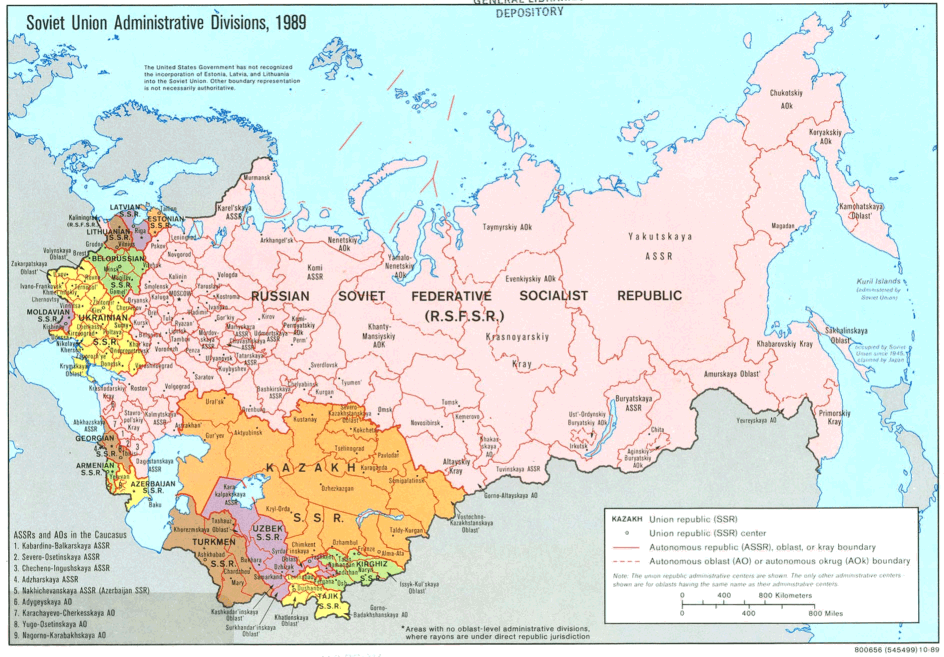
Abb.: Verwaltungsgliederung der Sowjetunion, 1989
(Quelle: CIA)
Zur Sowjetunion gehörten folgende heutige Staaten:
"Business oligarch, a synonym of "business magnate", describes wealthy people that significantly influence the life of a state. The term came into wide circulation after the collapse of the Soviet Union in application to the people that became extremely wealthy in some post-Soviet republics. In particular, the term Russian oligarch describes Russian businessmen who came to prominence during the presidency of Boris Yeltsin. Russia
Abb.: Michail Gorbachev - Михаи́л Серге́евич Горбачёв
[Bildquelle. Wikipedia]The oligarchs started under Gorbachev [Михаи́л Серге́евич Горбачёв] during his period of market liberalization. Under the market liberalization, many smuggled rare goods into the country, such as PCs, and jeans, for a hefty profit margin, an unforeseen consequence of partial market liberalization with still excessive trade restrictions, and the willingness of some, less savory characters, to smuggle goods into the country and sell them on the black market.
Post-Soviet business oligarchs tended to achieve vast wealth by acquiring state assets very cheaply during the privatization process started by the Yeltsin [Борис Николаевич Ельцин] government. Specific blame for their ascent to power is often levied on Anatoly Chubais [Анато́лий Бори́сович Чуба́йс] and Yegor Gaidar [Его́р Тиму́рович Гайда́р], two of the 'Young Reformers' chiefly responsible for 'shock therapy' privatization in the early 1990's. According to David Satter, author of Darkness at Dawn, "what drove the process was not the determination to create a system based on universal values but rather the will to introduce a system of private ownership, which, in the absence of law, opened the way for the criminal pursuit of money and power."
Abb.: Anatoly Chubais - Анато́лий Бори́сович Чуба́йс Abb.: Yegor Gaidar - Его́р Тиму́рович Гайда́р [Bildquelle. Wikipedia] As Yeltsin's power weakened, oligarchs became increasingly influential in politics and played a significant role in financing the re-election of Yeltsin in 1996. The 1998 financial crisis hit the oligarchs hard, however, and those whose holdings were based on banking lost much of their fortunes. In the Putin [Влади́мир Влади́мирович Пу́тин] era, the remaining oligarchs have come under fire for various alleged and real illegal activities, particularly the underpayment of taxes in the businesses they acquired. Vladimir Gusinsky [Владимир Гусинский] (MediaMost) and Boris Berezovsky [Борис Березовский] were both effectively exiled, and the most prominent, Mikhail Khodorkovsky [Михаил Ходорковский] (Yukos oil), was arrested in October 2003, sentenced to 8 years, and (as of 7/05) is in jail, with his company trying desperately to protect itself from being dismantled.
Their defenders (often associated with Chubais's party—the Union of Right Forces [Сою́з Пра́вых Сил, СПС]) argue the companies they acquired were not highly valued at the time because they were still run on Soviet principles, with non-existent stock controls, huge payrolls, no financial reporting and scant regard for profit. They turned the businesses—often vast—around and made them deliver value for shareholders. They obtain little sympathy from the Russian public, though, due to resentment over the economic disparity they represent aggravated by the fact that many prominent oligarchs are of Jewish descent.
In 2004, Russian Forbes listed 36 billionaires of Russian citizenship, with an interesting note: "this list includes businessmen of Russian citizenship who acquired the major share of their wealth privately, while not holding a governmental position". In 2005, the number of billionaires dropped to 30, mostly because of the Yukos case, with Khodorkovsky dropping from #1 ($15.2 bln) to #21 ($2.0 bln)
Russian oligarchs
Russland
РоссияFrom Russian Forbes, May 2005. Wealth in 1,000,000,000 USD.
Other notable oligarchs
- Roman Abramovich 14.7 (Роман Абрамович, Sold Sibneft Oil and owns Chelsea Football Club)
- Vladimir Lisin 7.0 (Владимир Лисин, metallurgy)
- Viktor Vekselberg 6.1 (Виктор Вексельберг, petroleum, color metals)
- Oleg Deripaska 5.8 (Олег Дерипаска, Russian Aluminium)
- Mikhail Fridman 5.8 [Михаи́л Мара́тович Фри́дман] (Alfa Group)
- Vladimir Evtushenkov 5.1 (Владимир Евтушенков, telecommunications, finance, real estate)
- Aleksey Mordashov 5.1 (Алексей Мордашов, black metallurgy)
- Vladimir Potanin 4.7 (Владимир Потанин, Norilsk Nickel).
- Mikhail Prokhorov 4.7 (Михаил Прохоров, color metals)
- Vagit Alekperov 4.1 (Вагит Алекперов, petroleum (LUKoil))
- Viktor Rashnikov 3.6 (Виктор Рашников, black metallurgy)
- German Khan 3.5 (Герман Хан, petroleum, finances, telecom)
- Boris Ivanishvili 3.0 (Борис Иванишвили, metellurgy, finances)
- Alexamder Abramov 2.9 (Александр Абрамов, black metallurgy)
- Aleksei Kuzmichev 2.7 (Алексей Кузьмичев, petroleum, finances, telecom)
- Suleiman Kerimov 2.6 (Сулейман Керимов, investor)
- Vladimir Bogdanov 2.3 (Владимир Богданов, petroleum (Surgutneftegaz))
- Iskander Makhmudov 2.2 (Искандер Махмудов, color metals)
- Nickolay Tsvetkov 2.2 (Николай Цветков, petroleum, finances)
- Alisher Usmanov 2.0 (Алишер Усманов, black metallurgy)
- Mikhail Khodorkovsky 2.0 (Михаил Ходорковский, Yukos oil)
- Boris Berezovsky 0.73 (Борис Березовский)
- Vladimir Gusinsky 0.35 (Владимир Гусинский, MediaMost)
- Anatoly Chubais (Анатолий Чубайс, Unified Energy System)
- Yuri Luzhkov (Юрий Лужков, Mayor of Moscow)
[edit]Ukrainian oligarchs
Ukraine
Україна
Ukrajina
- Rinat Akhmetov [Ринат Леонідович Ахметов] is the wealthiest man in Ukraine.
- Viktor Pinchuk [Виктор Пинчук], the son-in-law of ex-president Leonid Kuchma [Леонід Данилович Кучма], is the second wealthiest man in Ukraine and controls much of the nation's media.
- Yuliya Tymoshenko [Юлія Володимирівна Тимошенко], the ex-Prime Minister of Ukraine, and a close ally of President Viktor Yushchenko [Віктор Андрійович Ющенко], is also one of the wealthiest persons in Ukraine. She is said to have acquired her wealth when former Prime Minister Pavlo Lazarenko [Павло Іванович Лазаренко] let her set up a company that sold Russian natural gas for shares in Ukrainian businesses.
[Quelle: http://en.wikipedia.org/wiki/Russian_oligarchs. -- Zugriff am 2005-12-02]
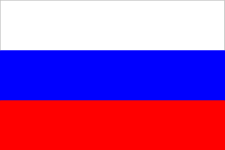
Russland
Россия
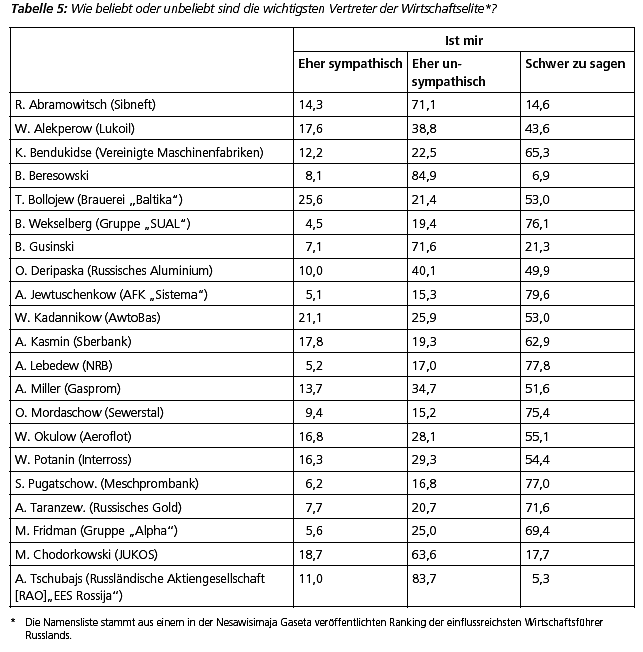
[Quelle der Abb.: Angela Rustemeyer: Putins Oligarchenfeldzug und Demokratie. -- Moskau, 2004. -- http://www.fesmos.ru/Pubikat/18_Putins%20Oligarchenfeldzug2005/Putins%20Oligarchenfeldzug%20und%20Demokratie.pdf. -- Zugriff am 2005-12-03]
"The "loans for shares" scheme and the rise of the "oligarchs" The new capitalist opportunities presented by the opening of the Russian economy in the late 1980s and early 1990s affected many people's interests. As the Soviet system was being dismantled, well-placed bosses and technocrats in the Communist Party, the KGB [КГБ], and the Komsomol [Комсомол] (Soviet Youth League) were cashing in on their Soviet-era power and privileges. Some quietly liquidated the assets of their organization and secreted the proceeds in overseas accounts and investments. Others created banks and businesses in Russia, taking advantage of their insider positions to win exclusive government contracts and licenses and to acquire financial credits and supplies at artificially low, state-subsidized prices in order to transact business at high, market-value prices. Great fortunes were made almost overnight.
Abb.: KGB-Abzeichen
[Bildquelle: Wikipedia]The privatization program was deeply corrupt from the beginning. The Western world generally advocated a quick dismantling of the Soviet planned economy to make way for "free-market reforms," but later expressed disappointment over the newfound power and corruption of the "oligarchs". Some called this wave of plundering "nomenklatura [номенклату́ра] capitalism". By the time the Yeltsin [Борис Николаевич Ельцин] government launched radical reforms, the "nomenklatura capitalists" had already entrenched themselves as powerful players.
Privatization of state enterprises subsequently gave many who had gained wealth in the early 1990s an opportunity to convert it into shares of privatized enterprises. The Yeltsin government hoped to use privatization to spread ownership of shares in former state enterprises as widely as possible to create political support for his government and his reforms.
Abb.: "This Russian federal privatisation voucher was issued in 1992 and meant to provide holders a means to invest in newly- privatised enterprises. Instead, they were for the most part bartered, traded and sold, and many ended up being worthless --such as this specimen, which a Siberian village resident gave as a gift to one of the Siberia project group researchers."
[Quelle von Bild und Text: http://www.eth.mpg.de/subsites/siberia/obshchina.html. -- Zugriff am 2005-12-05]
The government used a system of free vouchers as a way to give mass privatization a jump-start. But it also allowed people to purchase shares of stock in privatized enterprises with cash. As the government ended the voucher privatization phase and launched cash privatization, it devised a program that it thought would simultaneously speedup privatization and yield the government a much-needed infusion of cash for its operating needs.
Under the scheme, which quickly became known in the West as "loans for shares", the Yeltsin regime auctioned off substantial packages of stock shares in some of its most desirable enterprises, such as energy, telecommunications, and metallurgical firms, as collateral for bank loans.
In exchange for the loans, Yeltsin handed over assets worth many times as much. Under the terms of the deals, if the Yeltsin government did not repay the loans by September 1996, the lender acquired title to the stock and could then resell it or take an equity position in the enterprise. The first auctions were held in the fall of 1995. The auctions themselves were usually held in such a way so to limit the number of banks bidding for shares and thus to keep the auction prices extremely low. By summer 1996, major packages of shares in some of Russia's largest firms had been transferred to a small number of major banks, thus allowing a handful of powerful banks to acquire substantial ownership shares over major firms at shockingly low prices. These deals were effectively giveaways of valuable state assets to a few powerful, well-connected, and wealthy financial groups.
The concentration of immense financial and industrial power, which loans for shares had assisted, extended to the mass media. One of the most prominent of the financial barons, Boris Berezovsky [Бори́с Абра́мович Березо́вский], who controlled major stakes in several banks and companies, exerted an extensive influence over state television programming for a while. Berezovsky and other ultra-wealthy, well-connected tycoons who controlled these great empires of finance, industry, energy, telecommunications, and media became known as the "Russian oligarchs". Along with Berezovsky,
- Mikhail Khodorkovsky [Михаи́л Бори́сович Ходорко́вский],
- Roman Abramovich [Рома́н Арка́дьевич Абрамо́вич],
- Vladimir Potanin [Владимир Потанин],
- Vladimir Bogdanov [Владимир Богданов],
- Rem Viakhirev [Рэм Вяхирев],
- Vagit Alekperov [Вагит Юсуфович Алекперов],
- Viktor Chernomyrdin [Ви́ктор Степа́нович Черномы́рдин],
- Victor Vekselberg [Виктор Вексельберг], and
- Mikhail Fridman [Михаи́л Мара́тович Фри́дман]
emerged as Russia's most powerful and prominent oligarchs.
Corruption covered the entire span of social relations in the new Russia. Currently, the bottom end consists of drug lords and leaders in organized crime (see also Russian Mafia). Between them is a small army of civil servants turned petty extortionists that emerged from the ruins of the socialist system.
A tiny clique who used their connections built up during the last days of the Soviet years to plunder Russia's vast resources during the rampant privatizations of the Yeltsin years, the oligarchs emerged as the most hated men in the nation. In Russia today, the oligarchs control up to 85 percent of the value of the country's leading private companies."
[Quelle: http://en.wikipedia.org/wiki/History_of_post-Soviet_Russia#The_.22loans_for_shares.22_scheme_and_the_rise_of_the_.22oligarchs.22. -- Zugriff am 2005-112-02]
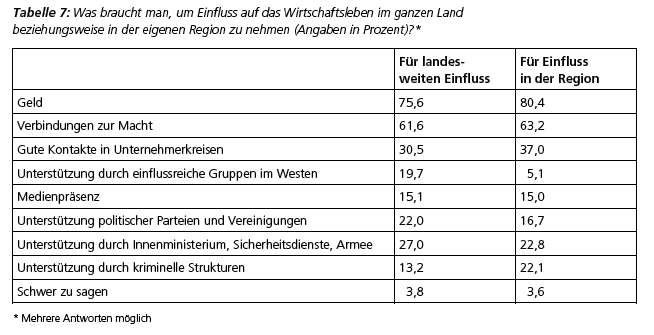
[Quelle der Abb.: Angela Rustemeyer: Putins Oligarchenfeldzug und Demokratie. -- Moskau, 2004. -- http://www.fesmos.ru/Pubikat/18_Putins%20Oligarchenfeldzug2005/Putins%20Oligarchenfeldzug%20und%20Demokratie.pdf. -- Zugriff am 2005-12-03]
Warum sind so viele der Oligarchen Juden?
"Am Rand der sibirischen Stadt Omsk liegt eine riesige Fabrik. Alljährlich transportieren Lastwagen 300000 Schweine in das Werk. Dort werden sie geschlachtet, zerlegt und verpackt, wonach man sie tonnenweise in Form von Speck sowie zentnerweise in Form von Schinken und Koteletts wieder hinausfährt. Einer der Hauptaktionäre von Omski Bekon [Омский Бекон] (Omsker Speck) ist - überraschenderweise, wie man meinen könnte - Jude. Abramowitsch [Роман Абрамович] nimmt die jüdischen Ernährungsvorschriften allerdings nicht sehr ernst, was typisch für seine Glaubensbrüder in Russland ist. Jewgeni Satanowski [Евгений Сатановский], der Vorsitzende des Russischen Jüdischen Kongresses (RJ K) [Российский еврейский конгресс], vermutet, dass von den 2 bis 3 Millionen Russen, die sich als jüdisch begreifen, nur 2000 das Verbot von Schweinefleisch beachten. Aber genauso verblüffend wie der weltliche Charakter des russischen Judentums ist seine kulturelle Stärke nach Jahren der Diskriminierung. Dieser Faktor dürfte für den erstaunlichen Erfolg der jüdischen Oligarchen verantwortlich sein. Während die Juden weniger als 2 Prozent der Bevölkerung ausmachen, findet man unter ihnen viele der bedeutendsten Oligarchen - Männer wie Abramowitsch [Роман Абрамович], Chodorkowski [Михаил Ходорковский], Beresowski [Борис Березовский], Gussinski [Владимир Гусинский] oder Friedman [Михаи́л Мара́тович Фри́дман].
Die überzeugendste Erklärung hierfür liefert die These von der »gläsernen Decke«. Da den Juden sämtliche Aufstiegsmöglichkeiten durch institutionalisierte Diskriminierung versperrt waren, suchten sie Wege, das System zu umgehen. Während den nichtjüdischen Russen, Ukrainern, Georgiern und anderen, deren Ehrgeiz nicht so stark eingegrenzt war, der Unternehmergeist unter dem Kommunismus auf geradezu chirurgische Art entfernt wurde, entwickelten die Juden eine Kultur der Initiative und des Risikos. In seiner kurzen Geschichte der postsowjetischen jüdischen Organisationen schreibt Satanowski [Евгений Сатановский]: »Selbst nach der Aufhebung der politischen Massenrepressionen blieb der offizielle Antisemitismus als politische Methode in den achtziger Jahren bestehen, was die russischen Juden veranlasste, ihre eigene informelle Subkultur zu schaffen.« Als das Privatunternehmertum nach 70 Jahren des Kommunismus endlich legalisiert wurde, waren diejenigen, die am stärksten unter dem System gelitten hatten, am besten gerüstet, die neuen Chancen zu nutzen. Mit den Worten eines Kommentators: »Im Land der Blinden ist der Einäugige König.«"[Quelle: Midgley, Dominic <1962 - > ; Hutchins, Chris <1941 - >: Der Milliardär aus dem Nichts — Roman Abramowitsch. -- Hamburg : Murmann, 2005. -- 317 S. : Ill. -- Originaltitel: Abramovich : the billionaire from nowhere (2004). -- ISBN 3-938017-30-9. -- S. 138f. -- {Wenn Sie HIER klicken, können Sie dieses Buch bei amazon.de bestellen}
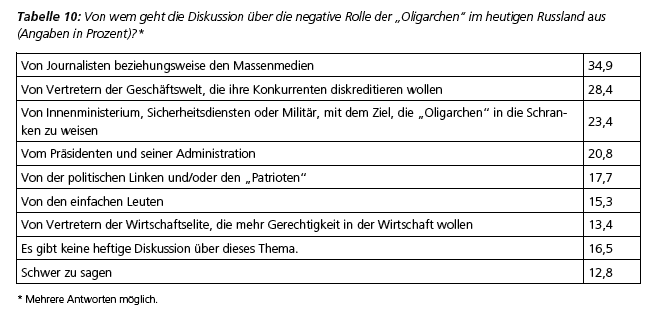
[Quelle der Abb.: Angela Rustemeyer: Putins Oligarchenfeldzug und Demokratie. -- Moskau, 2004. -- http://www.fesmos.ru/Pubikat/18_Putins%20Oligarchenfeldzug2005/Putins%20Oligarchenfeldzug%20und%20Demokratie.pdf. -- Zugriff am 2005-12-03]
[Quelle der Abb.: Angela Rustemeyer: Putins Oligarchenfeldzug und Demokratie. -- Moskau, 2004. -- http://www.fesmos.ru/Pubikat/18_Putins%20Oligarchenfeldzug2005/Putins%20Oligarchenfeldzug%20und%20Demokratie.pdf. -- Zugriff am 2005-12-03]
"Campaign Against the Oligarchs A group of Russia’s top businessmen formed close ties with the country’s leadership in the 1990s, gaining significant influence with the
Presidential Administration and President Boris Yeltsin [Борис Николаевич Ельцин] himself. WhenVladimir Putin [Владимир Владимирович Путин] assumed office in 2000, the destiny of most of these influential tycoons turned to disfavor.
Vladimir Gusinsky [Владимир Гусинский]: The Trials of a Media Baron
One of the first to suffer President Putin’s wrath was Vladimir Gusinsky, owner of a media empire famous for financing printed and broadcasting media outlets — among them the popular Ekho Moskvy [Эхо Москвы] radio station and the NTV [НТВ] television channel — often openly critical of Russia’s authorities and government policies. In May 2000 the headquarters of Gusinsky’s Media-Most Group [Медиа-Мост] were raided by armed and masked federal agents who identified themselves as officers of the tax police. In June 2000 Gusinsky was arrested on charges of stealing state property valued at $10 million. After three days of detention he was released under a travel ban.
Meanwhile, NTV shareholder, the partly state-ownedGazprom [ Газпром] gas company, and various state-controlled lending institutions demanded that Media-Most repay loans totaling hundreds of millions of dollars. Gusinsky resolved the conflict by signing a secret protocol with press minister Mikhail Lesin and head of Gazprom’s media arm Alfred Kokh, who dropped all charges against Gusinsky on the condition that he sell his controlling stake in Media-Most to Gazprom. With the criminal case against him closed, Gusinsky left Russia but soon announced that he had been forced to sign the protocol “under the barrel of a gun”, refusing to sell the stake.
Gazprom sued Media-Most for breach of contract, and theProsecutor General opened a new criminal case, this time related to alleged illegal transfers of assets abroad by Gusinsky and other Media-Most executives.
In December 2000, Gusinsky was arrested in Spain on an Interpol warrant filed by Russian prosecutors. He was later released on bail. Some of his newspapers were shut down, Gazprom became the owner of several media outlets belonging to Most Group, the NTV board was replaced, its key staff leaving the channel. In August 2003, Gusinsky was arrested once again, this time in Greece under a treaty with Russia but released soon afterwards.
In May, 2004 Vladimir Gusinsky won a case against the Russian government in the European Court of Human Rights in Strasbourg, the judges deciding unanimously in favour of the exiled tycoon, and ruling that Russia’s authorities had violated Article 5 and 18 (the said articles dealing with freedom and security) of the European Convention for Human Rights in relation to Gusinsky.
Potanin, et al
In July 2000 another oligarch, the head of the InterRos investment companyVladimir Potanin [Владимир Потанин] received a letter from the deputy prosecutor general with demand to pay $140 million to the state as compensation for the cheap purchase of the controlling stake in Norilsk Nickel [Норильский никель]. The case was soon dropped. At the same time, the head ofLukoil Oil Company [ЛУКОЙЛ] Vagit Alekperov [Вагит Алекперов] was charged with tax fraud.
Boris Berezovsky [Борис Березовский]: The Fall of the Kremlin’s Grey Cardinal
During the Yeltsin-era the name of Boris Berezovsky — media, car and airline tycoon — was virtually synonymous to shady behind-the-scenes influence and covert power. One of the closest members of President Yeltsin’s inner-circle, in the mid-1990s Berezovsky openly entered politics and was appointed secretary of Russia’s National Security Council and head of the Executive Committee of theCIS . He was behind the creation of the pro-Kremlin Unity party that came second (after theCommunists ) in the 1999 parliamentary elections, as well as being chief negotiator of the peace treaty that ended the firstChechen war in 1996.
On July 8, 2000, Vladimir Putin announced in his address that Russia would no longer tolerate ’’shady groups’’ that divert money abroad, establish their own ’’dubious’’ security services, and block the development of a liberal market economy. Soon after Berezovsky voiced his plans to create an opposition party led by regional governors and other influential figures threatened by Putin’s drive for power. At the end of the year the prosecution declared Berezovsky the main suspect in the misappropriation of large sums from Aeroflot [Аэрофло́т]— Russia’s national airline in which he owned large stakes. A similar case against Berezovsky dealt with large-scale fraud in his Logovaz [ЛогоВаз] car company.
Berezovsky left Russia at the end of 2000. In March 2003, he was arrested in London but released on bail. In October of the same year he received political asylum in the United Kingdom. His stake in Russia’s major television company ORT [ОРТ] (now First Channel [Первый Канал]) was sold, and his own TV6 channel was closed by a ruling of the Russian Arbitration Court. Still an active critic of President Putin, Boris Berezovsky is now living under the name of Platon Yelenin.
The Yukos [ЮКОС] Case
The latest and most talked-about case of the Kremlin’s fight against the oligarchs began in July 2003 when one of the major shareholders of Russia’s oil giantYukos Platon Lebedev was arrested on charges of illegally acquiring a stake in the state-owned fertilizer plant Apatite. On October 25, Yukos CEOMikhail Khodorkovsky [ Михаил Ходорковский] , known for his funding of liberal opposition parties and open criticism of President Putin’s rule, was arrested at gunpoint by a special squad ofFSB agents. Khodorkovsky was charged with tax fraud and evasion, with several bail requests denied by the courts.
Once in custody, Mikhail Khodorkovsky resigned as Yukos CEO. Several other core Yukos shareholders, including Khodorkovsky’s close friend and former rector of the Yukos-sponsored Russian State University for the Humanities Leonid Nevzlin, left Russia and were placed on the international wanted list by Russia’s Prosecutor General’s Office. The “Yukos case” received wide publicity and was denounced by various human rights groups as being politically motivated.
In March 2004 Mikhail Khodorkovsky’s open letter titled The Crisis of Liberalism in Russia was published by Russian business daily Vedomosti [ВЕДОМОСТИ]. In it Khodorkovsky called on Russia’s top businessmen to face up to the fact that most major privatizations in the country were conducted with a disregard for the interests of its people and to ’’recognize the legitimacy of President Vladimir Putin“. Khodorkovsky later stated that the letter was in fact a result of a ”collective authorship“ but that he agreed with its content and admitted responsibility as the person who agreed to put his name under it. Soon afterwards Leonid Nevzlin, now living in Israel, announced his withdrawal from politics and the end of his funding of the liberal opposition in Russia [Сою́з Пра́вых Сил, СПС], namelyIrina Khakamada , saying that he regarded Khodorkovsky’s letter as a request and even an order to leave the political scene.
Abb.: Irina Mutsuovna Khakamada — Ири́на Муцу́овна Хакама́да (Russin, japanischen Ursprungs: イリーナ・ムツオヴナ・ハカマダ) (1955 - )After an appeal from Platon Lebedev’s lawyers, the criminal cases of Khodorkovsky and Lebedev were joined into one, with the two Yukos shareholders currently awaiting trial, set for July 12, 2004.
Updated: 23.09.2005 21:36 MSK"
[Quelle: http://mosnews.com/mn-files/oligarchs.shtml#news. -- Zugriff am 2005-12-06]
Dieses Kapitel besteht weiters aus folgenden Teilen:
Zu Teil 1: Russland (Россия)